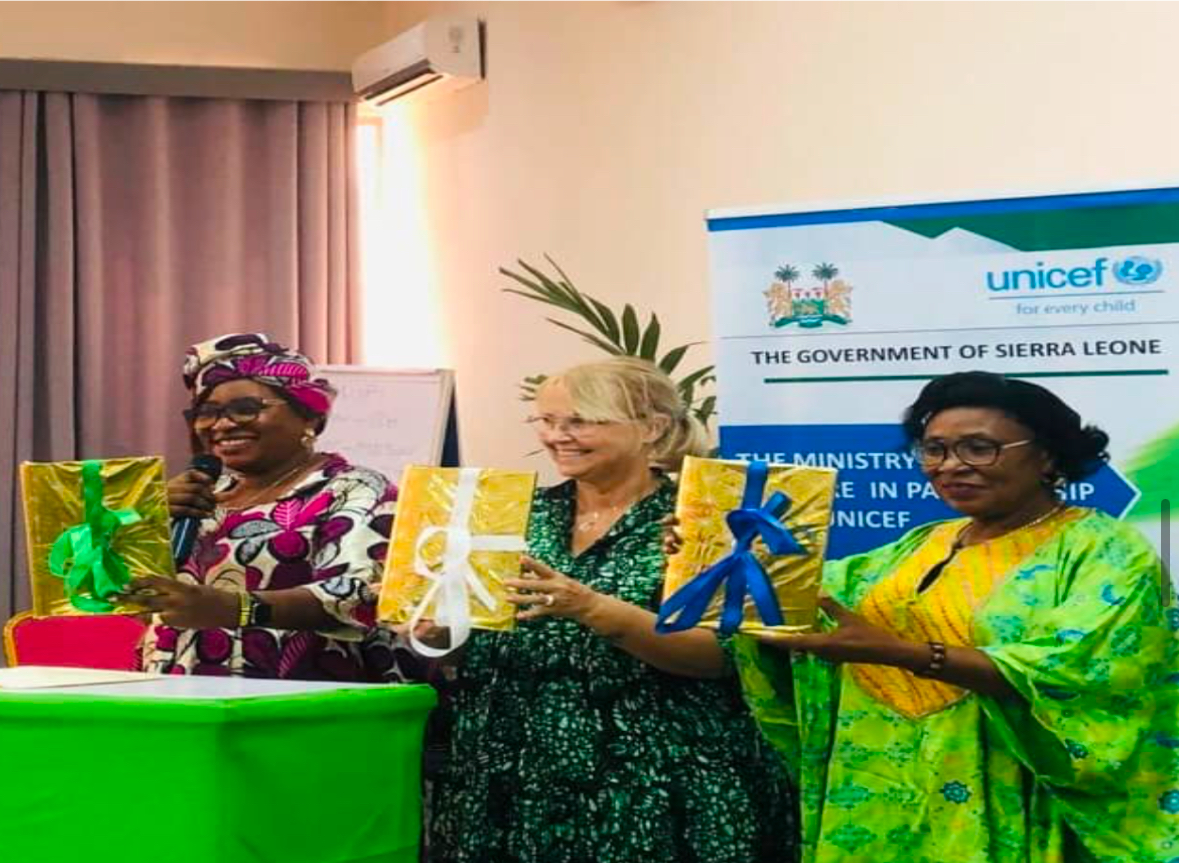AYV News, November 22, 2024
The Government of Sierra Leone through the Ministry of Social Welfare and its partners has launched the National Positive Parenting Education Program.
Speaking at the launching ceremony as the keynote speaker as well as launching the initiative, Minister of Social Welfare Honourable Mrs. Melrose Karminty said that the Positive Parenting Education Programme supported by UNICEF seeks to contribute to the development of a parenting education program for Sierra Leone that will strengthen the ability of parents and caregivers to provide a protective environment that promotes and supports the physical, cognitive, social, emotional, psychological, and educational development from infancy to adulthood and one that builds a strong family.
The minister noted that research and studies conducted over the years show that violence is the most common tool used by parents and caregivers to discipline children. She furthered that these violent acts take different forms, from corporal punishments to the inhuman act of burning hands and other forms of bodily harm. She continued that research studies have also shown that parents love their children very much and want the best for them, but the cycle of violence continues because the parents are repeating their childhood experiences and what they know as discipline to their own children.
The minister said that the Positive Parenting Education Program, known locally as ‘Gud Kombra Na Gladi Famili’, was borne out of the outcomes of a survey and plea from parents and caregivers that they needed help with dealing with the issues of childhood, childcare, and child development.
Speaking on the focus of the initiative, Honourable Mrs. Melrose Karminty said that positive parenting focuses on five (5) core principles, which are ensuring a safe, engaging environment, promoting a positive learning environment, using assertive discipline, maintaining reasonable expectations, and taking care of oneself as a parent.
She said as part of best practices globally, studies have shown that teaching and leading promote children’s confidence and provide them with the tools needed to make good choices; positive communication promotes children’s social and problem-solving skills while enhancing relationship quality with parents, caregivers, and peers; warm and democratic parenting enhances children’s self-esteem and confidence; parental supervision promotes prosocial peer bonding and positive youth outcomes; autonomy-promoting parenting supports creativity, empowerment, and self-determination; and supportive and optimistic parenting fosters children’s belief in themselves and the future.
She disclosed that the Ministry of Social Welfare Government of Sierra Leone will have oversight and coordination responsibility working in collaboration with other line ministries, including the Ministry of Gender and Children’s Affairs-SL, the Ministry of Basic and Senior Secondary Education SL, and the Health Education Programme, Ministry of Health and Sanitation, to ensure holistic support to children, adolescents, and their families at national and regional/district levels with support from UNICEF.
The program, she said, is a community-based program with sessions delivered by trained community facilitators to parents and caregivers and supervised and monitored by trained child protection partners and social welfare staff at the community level, adding that it has standardized curricula for all children and their families that have been categorized into 3 age groups: 0-5 years, 6-10 years, and 11-17 years for parents and carers having these categories of children.
She furthered that this program has a national Technical Working Group (TWG) that provides technical direction to the content and implementation standards.
She concluded by urging all stakeholders MDAs, NGOs and civil society to be part of the process in cascading the PPEP nationwide after the launching ceremony, stating that they must provide the enabling environment led by government, that leads to a positive outcome, a clear coordination mechanism with roles and responsibilities; sufficient resources to maintain delivery of the parenting programme including referrals to services, adequately skilled, competent and supported workforce, and multi-sectoral engagement; PARENTS AND CAREGIVERS practice age-appropriate positive, non-violent, and nurturing parenting behaviours; CHILDREN AND ADOLESCENTS who are confident and able to communicate openly with their parents and caregivers. She further urged all stakeholders to prioritize the family as the entry point in addressing harmful practices and promoting positive parenting nationwide.
The Minister of Gender and Children’s Affairs, @Dr. Isata Mahoi, spoke about the crucial role of effective parenting in shaping the future of the nation. She highlighted the home as the primary environment where children learn important values such as love, respect, and responsibility.
Dr. Mahoi recognized the unique difficulties faced by families, such as economic hardships, social inequalities, and traditional cultural practices that can sometimes hinder effective parenting. She pointed out that the program aligns with national frameworks such as the Child Rights Act of 2007 and the National Policy on Gender Equality (GEWE 2020), which are essential for supporting families and safeguarding children’s rights.
Dr. Mahoi called for strong collaboration among government bodies, non-governmental organizations, community leaders, and parents to ensure the program’s success.
The Acting Minister of Basic and Senior Secondary School Education Emily Gogre on her part said that positive parenting includes both the mother and the father taking an active role in raising the child. She called on society to change the narrative that accords all praises to the father when the child comes out well and blames the mother when the child does not. She outlined five ways to nurture good parenting, which are values, region and mission, rules and regulations, consequences, and bonding time.
She encouraged everyone to contribute to raising a society that adds value to good parenting.

